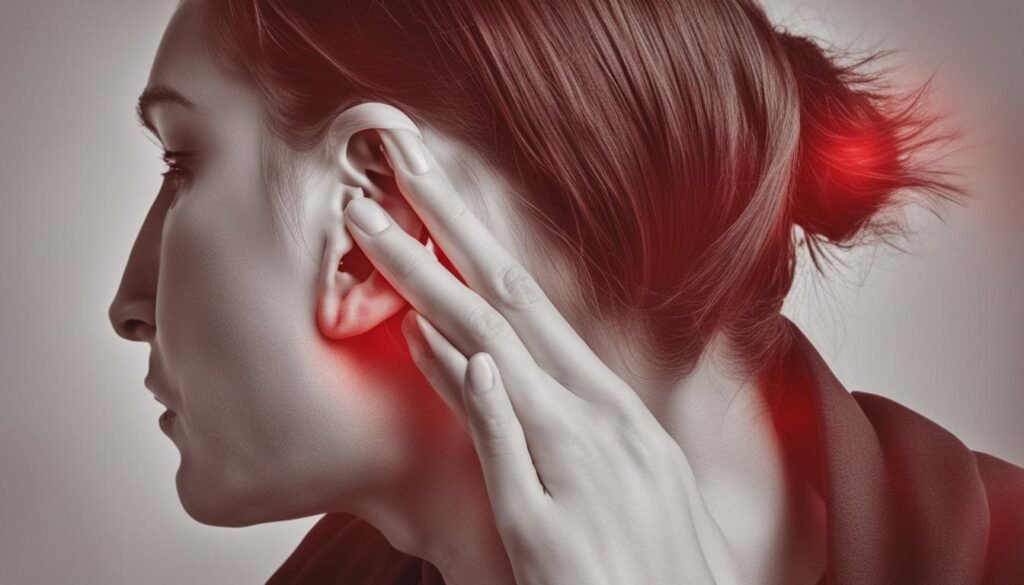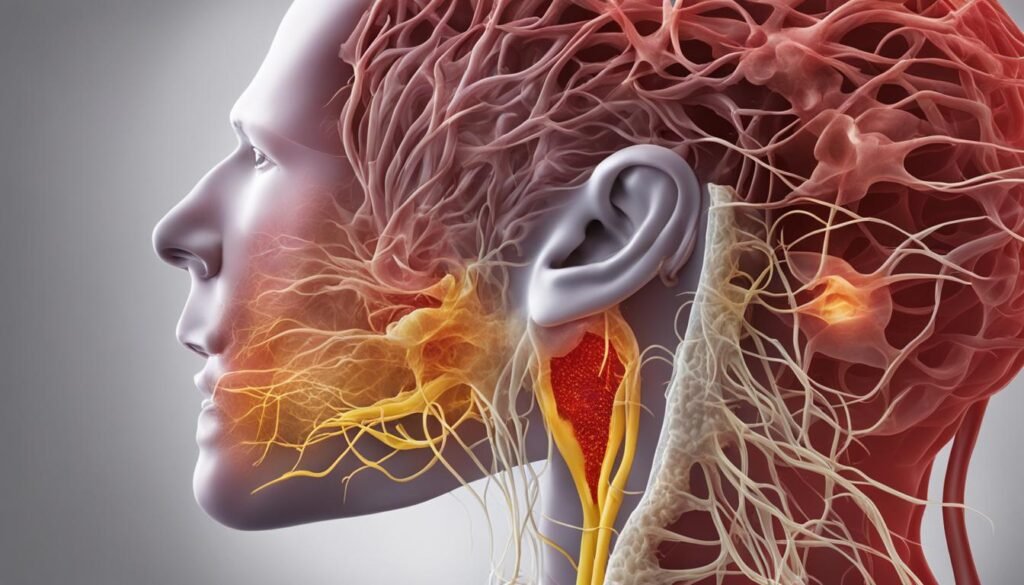Does sinus infection cause hearing loss? This is a question many people ask when faced with the common symptoms of sinusitis, such as nasal congestion, facial pain, and headaches. This article will delve into the potential connection between sinus infection and hearing impairment, examining how it might affect overall hearing health.
Understanding the link between sinus infections and hearing loss is important for those experiencing these symptoms. While sinusitis primarily affects the nasal passages, its impact on hearing can concern some. We will explore how a sinus infection could lead to hearing difficulties and the steps to manage or prevent it.
Key Takeaways:
- Sinus infection can cause temporary hearing loss and other hearing-related problems.
- The congestion and blockage in the Eustachian tube can lead to muffled hearing and a sensation of pressure in the ears.
- Sinusitis can also result in tinnitus, a ringing or buzzing sound in the ears.
- Managing the sinus infection is key to treating sinus-induced hearing issues.
- Seeking medical attention and addressing symptoms promptly can help prevent further complications.
How Does Sinus Infection Affect Hearing?
Sinus infection, also known as sinusitis, can directly impact hearing due to the congestion and blockage it causes in the Eustachian tube. The Eustachian tube regulates the pressure in the ears, allowing them to function correctly. When the sinuses become inflamed and congested, it can interfere with this pressure regulation and lead to various hearing problems.
One common effect of sinusitis on hearing is muffled hearing. The congestion and blockage in the Eustachian tube can prevent sound waves from travelling freely to the inner ear, reducing the clarity and volume of sounds. Individuals may also experience a feeling of fullness or pressure in the ears, which can further contribute to the perception of muffled hearing.
In some cases, sinusitis can lead to temporary hearing loss. This can occur when the infection spreads to the middle ear, causing inflammation and fluid buildup. The fluid in the middle ear can interfere with the vibration of the eardrum and the transmission of sound to the inner ear. However, it’s important to note that permanent hearing loss directly from sinusitis is rare.
Common Effects of Sinus Infection on Hearing:
- Muffled hearing
- The feeling of fullness or pressure in the ears
- Temporary hearing loss due to middle ear infection
It’s crucial to address sinusitis-related hearing issues promptly to prevent further complications. Proper sinus infection treatment can help alleviate congestion and restore normal hearing. If you experience any changes in your hearing or persistent ear-related symptoms, it is recommended to consult with a healthcare professional for an accurate diagnosis and appropriate treatment options.
Symptoms of Sinusitis and Ear Pain
Sinusitis is a common condition that affects millions of people worldwide. It occurs when the sinuses become inflamed and swollen, leading to uncomfortable symptoms. One of the lesser-known symptoms of sinusitis is ear pain, which can be quite distressing for those experiencing it.
The connection between sinusitis and ear pain lies in the intricate passages connecting the sinuses to the ears. When the sinuses become congested and inflamed, they can exert pressure on the surrounding structures, including the Eustachian tube. This tube is responsible for equalizing pressure in the ears, but it can cause ear pain and discomfort when it becomes blocked.
Common symptoms of sinusitis and ear pain include:
- Nasal congestion and stuffiness
- Facial pain and pressure
- Headaches
- Post-nasal drip
- Earache
- Jaw pain
- Dizziness
- Tinnitus (ringing or buzzing sensation in the ears)
It’s important to note that not everyone with sinusitis will experience ear pain, and the severity of symptoms can vary from person to person. Sometimes, the ear pain may be mild and resolve independently with proper sinusitis treatment. However, the ear pain may persist in more severe cases and require medical intervention.
Uncover the facts about how much hearing loss requires a hearing aid
If you are experiencing symptoms of sinusitis and ear pain, it is recommended to consult with a healthcare professional for an accurate diagnosis and appropriate treatment. They will be able to determine the underlying cause of your symptoms and recommend the best course of action to alleviate your discomfort.
The Duration and Treatment of Sinusitis Ear Pain
Regarding sinusitis-induced ear pain, the duration can vary depending on the severity of the infection and the individual’s immune response. In most cases, with proper treatment, ear pain caused by sinusitis improves within a few days. However, if the infection is left untreated, it may persist, leading to more serious complications.
Several treatment options are available to alleviate sinusitis and ear pain and promote healing. These include:
- Warm compresses: Applying a warm compress to the affected ear can help relieve pain and reduce inflammation.
- Over-the-counter pain relievers: Non-prescription pain relievers like acetaminophen or ibuprofen can help manage discomfort.
- Saline nasal sprays: Saline nasal sprays or rinses can help clear the nasal passages and reduce congestion.
- Staying hydrated: Drinking plenty of fluids can help thin mucus and facilitate its drainage, relieving pressure in the ears.
It’s important to note that these treatment options are primarily aimed at managing the symptoms of sinusitis ear pain. If the pain persists or worsens, or if other symptoms such as hearing loss or severe dizziness develop, it is essential to seek medical intervention. A healthcare professional can provide a thorough evaluation and determine if further medical treatments, such as antibiotics or nasal corticosteroids, are necessary to address the underlying sinus infection and prevent potential complications.
Preventing Hearing Loss Associated with Sinus Infections
While sinusitis can lead to temporary hearing loss, there are steps you can take to minimize the risk and protect your hearing:
- Seek timely medical attention: If you suspect a sinus infection, consult a healthcare professional for appropriate treatment. Early intervention can help prevent the infection from worsening and causing more severe complications.
- Address hearing-related symptoms: If you experience changes in your hearing or persistent ear-related symptoms such as pain or ringing, consult a healthcare professional. Prompt evaluation and treatment can help alleviate symptoms and prevent further damage.
- Practice sinus health habits: Maintain good sinus health by avoiding irritants such as cigarette smoke, minimizing exposure to allergens, and practising proper hygiene, such as washing hands regularly and avoiding touching your face.
Taking these proactive measures can reduce the likelihood of sinus infection-related hearing complications and promote overall ear health.
Managing Sinusitis and Preventing Hearing Loss
When dealing with sinusitis and its potential impact on hearing, taking proactive steps to manage the condition and prevent hearing loss is crucial. Following a few simple strategies can effectively alleviate sinus symptoms and safeguard your hearing health.

Promote Sinus Health
To maintain sinus health, minimising irritants and keeping your sinuses clear is important. This can be achieved by practising good hygiene, such as washing your hands frequently and avoiding close contact with individuals who have respiratory infections. Additionally, saline nasal spray or rinse can help reduce congestion and promote sinus drainage.
Manage Allergies
Allergies can worsen sinusitis symptoms and increase the risk of hearing complications. If you have allergies, it’s essential to identify and avoid the triggers that cause your symptoms. This may involve using allergy medications, implementing dust mite control measures, or seeking allergy immunotherapy.
Seek Medical Treatment
If you experience persistent or severe sinusitis symptoms, seeking medical attention is important. A healthcare professional can evaluate your condition, prescribe appropriate medications to reduce inflammation and congestion and provide guidance on managing the infection. They can also address hearing loss or related complications and recommend suitable treatment options.
By taking these steps, you can effectively manage sinusitis and minimize the risk of hearing loss. Remember to prioritize your sinus health, address allergies, and seek medical treatment when necessary. Taking proactive measures will alleviate symptoms and promote overall ear and hearing health.
The Connection Between Sinus Infection and Hearing Loss
Sinus infection, also known as sinusitis, can directly impact hearing. The connection between sinus infection and hearing loss lies in the congestion and blockage that sinusitis can cause in the Eustachian tube. This tube regulates the pressure in the ears, which can lead to various hearing complications when it becomes blocked.
One common symptom of sinus infection-related hearing loss is a feeling of fullness or pressure in the ears. This can result in a muffled hearing or a temporary decrease in hearing ability. Additionally, sinusitis can cause tinnitus, a ringing or buzzing sensation in the ears. While these symptoms can be distressing, it’s important to note that sinus-induced hearing loss and tinnitus are usually temporary and can improve with proper treatment.
Read Also: Do hearing aids prevent further hearing loss
Managing sinusitis is crucial in preventing further complications and restoring normal hearing. Treatment options for sinus infection-related hearing loss may include medications to reduce inflammation and congestion and lifestyle changes to promote sinus health. Seeking medical attention promptly can help alleviate symptoms and prevent long-term hearing issues.

Key Takeaways:
- Sinus infection can cause hearing loss due to congestion and blockage in the Eustachian tube.
- Common symptoms include muffled hearing, a feeling of fullness in the ears, and tinnitus.
- Seeking medical treatment and managing sinusitis is important in preventing further complications and restoring normal hearing.
Conclusion
Sinusitis can cause hearing loss and symptoms such as ear pain and tinnitus. However, it is important to note that most cases of sinusitis-related hearing loss are temporary and can be effectively managed by addressing the underlying sinus infection.
If you experience muffled hearing, pressure in your ears, or any other changes in your hearing, it is crucial to seek medical attention. A healthcare professional can provide appropriate treatment options to alleviate symptoms and prevent further complications.
Managing sinusitis involves seeking medical treatment for the infection, which may include medications to reduce inflammation and congestion. Additionally, lifestyle changes, such as minimizing irritants and promoting sinus health, can help prevent hearing loss and related complications.
Remember, early intervention is key. Prompt medical attention and treatment can help restore normal hearing and improve overall quality of life for individuals experiencing sinusitis-related hearing issues.
Frequently Asked Questions
Does sinus infection cause hearing loss?
Yes, a sinus infection can cause temporary hearing loss due to congestion and blockage in the Eustachian tube.
How does sinus infection affect hearing?
Sinus infection can lead to muffled hearing, a feeling of fullness in the ears, and, in some cases, temporary hearing loss.
What are the symptoms of sinusitis and ear pain?
Symptoms of sinusitis include nasal congestion, facial pain, post-nasal drip, and earache. Sinusitis can also cause jaw pain, dizziness, and tinnitus.
How long does ear pain caused by sinusitis last?
The duration of ear pain varies depending on the severity of the infection, but it typically improves within a few days of starting treatment for sinusitis.
How is sinusitis ear pain treated?
Treatment options for sinusitis-related ear pain include warm compresses, over-the-counter pain relievers, saline nasal sprays, and staying hydrated. In severe cases, medical intervention may be necessary.
How can sinusitis be managed to prevent hearing loss?
Seek medical treatment for the sinus infection, including medications to reduce inflammation and congestion. Make lifestyle changes to minimize irritants and promote sinus health. Promptly address hearing loss or tinnitus symptoms and consult a healthcare professional for appropriate treatment options.
What is the connection between sinus infection and hearing loss?
Sinus infection can cause hearing loss due to congestion and blockage in the Eustachian tube. This disrupts pressure regulation in the ears. However, sinus-induced hearing loss is usually temporary and can be treated by managing the sinus infection.



